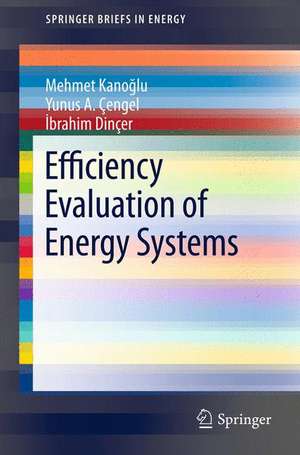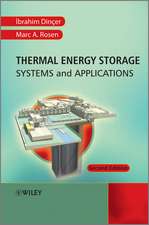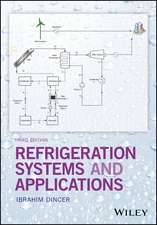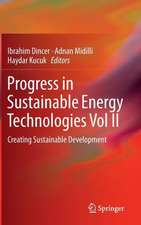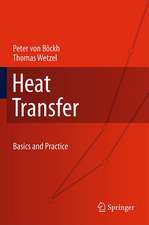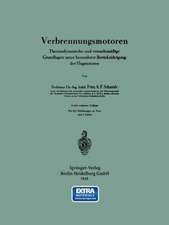Efficiency Evaluation of Energy Systems: SpringerBriefs in Energy
Autor Mehmet Kanoğlu, Yunus A. Çengel, Ibrahim DinCeren Limba Engleză Paperback – 5 apr 2012
Din seria SpringerBriefs in Energy
-
 Preț: 345.89 lei
Preț: 345.89 lei -
 Preț: 345.89 lei
Preț: 345.89 lei -
 Preț: 376.04 lei
Preț: 376.04 lei -
 Preț: 377.35 lei
Preț: 377.35 lei -
 Preț: 476.42 lei
Preț: 476.42 lei -
 Preț: 343.36 lei
Preț: 343.36 lei -
 Preț: 374.85 lei
Preț: 374.85 lei -
 Preț: 376.59 lei
Preț: 376.59 lei -
 Preț: 477.72 lei
Preț: 477.72 lei -
 Preț: 176.35 lei
Preț: 176.35 lei -
 Preț: 380.07 lei
Preț: 380.07 lei -
 Preț: 376.22 lei
Preț: 376.22 lei -
 Preț: 377.95 lei
Preț: 377.95 lei -
 Preț: 376.43 lei
Preț: 376.43 lei -
 Preț: 377.73 lei
Preț: 377.73 lei -
 Preț: 343.00 lei
Preț: 343.00 lei -
 Preț: 377.35 lei
Preț: 377.35 lei -
 Preț: 377.95 lei
Preț: 377.95 lei -
 Preț: 444.35 lei
Preț: 444.35 lei -
 Preț: 348.83 lei
Preț: 348.83 lei -
 Preț: 412.30 lei
Preț: 412.30 lei -
 Preț: 377.73 lei
Preț: 377.73 lei -
 Preț: 375.62 lei
Preț: 375.62 lei -
 Preț: 380.07 lei
Preț: 380.07 lei -
 Preț: 376.80 lei
Preț: 376.80 lei -
 Preț: 376.22 lei
Preț: 376.22 lei -
 Preț: 479.67 lei
Preț: 479.67 lei - 15%
 Preț: 463.85 lei
Preț: 463.85 lei -
 Preț: 476.79 lei
Preț: 476.79 lei -
 Preț: 375.23 lei
Preț: 375.23 lei -
 Preț: 379.09 lei
Preț: 379.09 lei -
 Preț: 376.22 lei
Preț: 376.22 lei -
 Preț: 409.43 lei
Preț: 409.43 lei - 15%
 Preț: 462.38 lei
Preț: 462.38 lei -
 Preț: 375.62 lei
Preț: 375.62 lei -
 Preț: 374.30 lei
Preț: 374.30 lei -
 Preț: 376.22 lei
Preț: 376.22 lei -
 Preț: 478.71 lei
Preț: 478.71 lei -
 Preț: 381.71 lei
Preț: 381.71 lei -
 Preț: 379.09 lei
Preț: 379.09 lei -
 Preț: 375.62 lei
Preț: 375.62 lei - 15%
 Preț: 463.35 lei
Preț: 463.35 lei -
 Preț: 376.80 lei
Preț: 376.80 lei -
 Preț: 374.46 lei
Preț: 374.46 lei -
 Preț: 477.56 lei
Preț: 477.56 lei -
 Preț: 379.48 lei
Preț: 379.48 lei -
 Preț: 374.30 lei
Preț: 374.30 lei -
 Preț: 479.47 lei
Preț: 479.47 lei -
 Preț: 378.12 lei
Preț: 378.12 lei
Preț: 414.21 lei
Nou
Puncte Express: 621
Preț estimativ în valută:
79.27€ • 82.25$ • 66.25£
79.27€ • 82.25$ • 66.25£
Carte tipărită la comandă
Livrare economică 15-29 martie
Preluare comenzi: 021 569.72.76
Specificații
ISBN-13: 9781461422419
ISBN-10: 1461422418
Pagini: 180
Ilustrații: IX, 170 p. 67 illus., 9 illus. in color.
Dimensiuni: 155 x 235 x 13 mm
Greutate: 0.25 kg
Ediția:2012
Editura: Springer
Colecția Springer
Seria SpringerBriefs in Energy
Locul publicării:New York, NY, United States
ISBN-10: 1461422418
Pagini: 180
Ilustrații: IX, 170 p. 67 illus., 9 illus. in color.
Dimensiuni: 155 x 235 x 13 mm
Greutate: 0.25 kg
Ediția:2012
Editura: Springer
Colecția Springer
Seria SpringerBriefs in Energy
Locul publicării:New York, NY, United States
Public țintă
ResearchCuprins
From the contents: Efficiency, Environment and Sustainability.- Introduction.- Energy, Exergy, Environment, and Sustainable Development.- Efficiency and Energy Management.- The First and the Second Laws of Thermodynamics.- Introduction.- Energy Change and Energy Transfer.- The First Law of Thermodynamics.- The Second Law of Thermodynamics.- Entropy.- Exergy.- Energy and Exergy Efficiencies.- Energy and Exergy Efficiencies.- Efficiencies of Cyclic Devices.- Efficiencies of Steady Flow Devices.- Energy Conversion Efficiencies.- Introduction.- Conversion Efficiencies of Common Devices.- Efficiencies of Mechanical and Electrical Devices.- Cryogenic Turbine Efficiencies.- Efficiencies of Power Plants.- Introduction.- Efficiencies of Vapor Power Cycles.- Efficiencies of Gas Power Cycles.
Textul de pe ultima copertă
Efficiency is one of the most frequently used terms in thermodynamics, and it indicates how well an energy conversion or process is accomplished. Efficiency is also one of the most frequently misused terms in thermodynamics and is often a source of misunderstanding. This is because efficiency is often used without being properly defined first. This book intends to provide a comprehensive evaluation of various efficiencies used for energy transfer and conversion systems including steady-flow energy devices (turbines, compressors, pumps, nozzles, heat exchangers, etc.), various power plants, cogeneration plants, and refrigeration systems. The book will cover first-law (energy based) and second-law (exergy based) efficiencies and provide a comprehensive understanding of their implications. It will help minimize the widespread misuse of efficiencies among students and researchers in energy field by using an intuitive and unified approach for defining efficiencies. The book will be particularly useful for a clear understanding of second law (exergy) efficiencies for various systems. It may serve as a reference book to the researchers in energy field. The definitions and concepts developed in the book will be explained through illustrative examples.
Caracteristici
An intuitive and clear description of efficiencies used for various energy conversion systems Particular emphasize on second-law (exergy) efficiencies Various efficiency definitions for power plants and refrigeration systems and their implications Extensive use of illustrative examples from real-world engineering applications Includes supplementary material: sn.pub/extras
